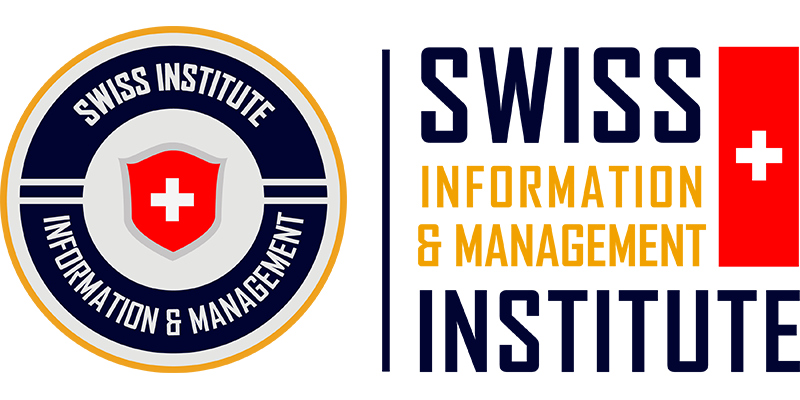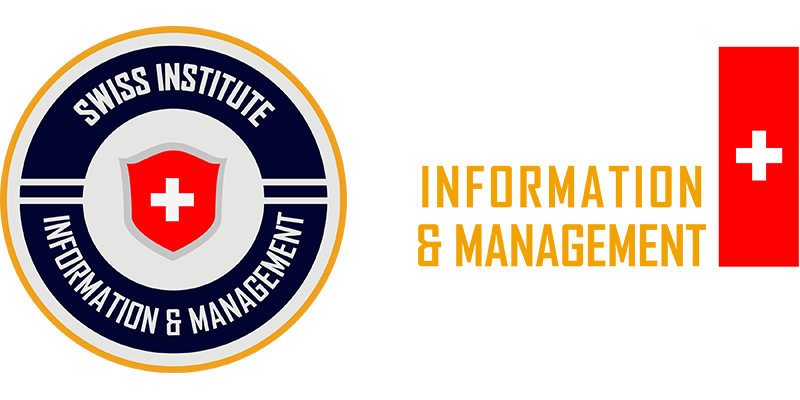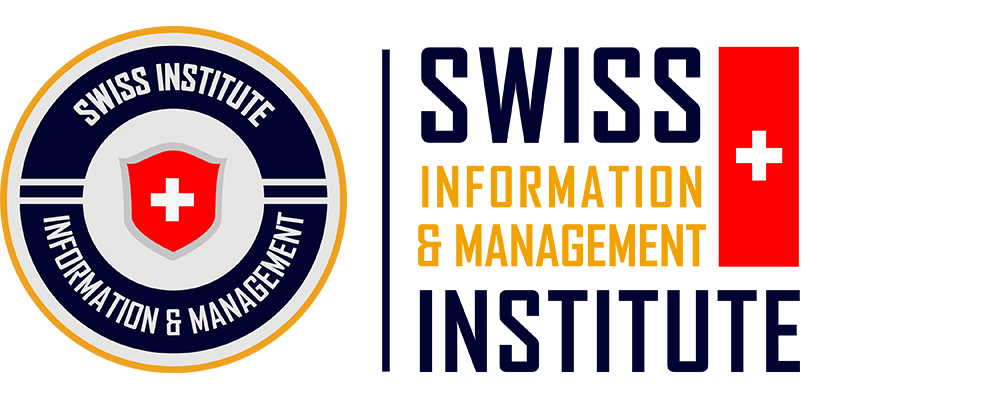The only Swiss Bachelor of IT and Web Design with fully recognized qualifications for each year
The Swiss Bachelor of IT and Web Design program stands out as a leading choice for students seeking to build a career in the digital world. This unique program offers fully recognized qualifications for each academic year, making it the only program in Switzerland to provide such an opportunity. With this structure, students can earn globally recognized credentials at the end of every year, allowing them to begin building their careers while continuing their studies. Designed to provide a comprehensive education in IT and web design, the program equips students with the technical skills and creativity needed to excel in the competitive job market from the very beginning of their studies.
Key Benefits of Fully Recognized Yearly Qualifications:
- Early Career Entry
- Financial Flexibility
- Increased Employability
- Career Security
- Global Recognition
- Academic and Professional Balance
- Flexibility in Progression
Along with globally recognized yearly qualifications, the SIMI Swiss BBA (with Hons) in IT and Web Design program understands what bachelor’s students need:
- Fully Accredited & Recognized
- The Swiss Student Card confirms official Swiss student status and eligibility with SIMI Swiss
- Certified & Micro-Credentials Included
- Multiple Qualifications from SIMI & Prestigious Universities
- Stay updated with the latest trends
- Flexible Learning Model
- Expand your business network
- Academic Support While Studying
- Tuition fee support provided by Swiss EduFund
Qualifications & Professional Recognition within a Bachelor of IT and Web Design Program:
- Year 1: Qualifi Level 4 Diploma in Information Technology (Gov Recognition No. 601/6048/2)
- Year 2: Qualifi Level 5 Diploma in IT Web Design (Gov Recognition No. 603/4793/4)
- Year 3: OTHM Level 6 Diploma in Business Management (Gov Recognition No. 603/2179/9)
- Final Stage: SIMI Swiss BBA (with Hons) in IT and Web Design (Full Accreditation & Recognition HERE)
International Accreditation
SIMI is accredited at both the institutional and programmatic levels by ASIC, HEAD, ISO 21001:2018, OTHM, and Qualifi, which is recognized by Ofqual.
Multi Qualifications
The program is widely recognized by the business community and partners, helping to optimize the use of the diploma after graduation.
26 Pro Recognize credentials
Learners earn 26 professional recognized certifications aligned with the European occupational framework, optimizing their skills upon graduation.
Academic & Research Support
The academic, research and language support system helps students overcome challenges so they can focus solely on excelling in their studies.
Learn and Earn
Year 1 Learn
1. Information Technology and IT Ethics (L/617/6692)
Overview
- Develop foundational knowledge of information technology, including hardware, software, and standard office applications.
- Explore ethical issues in IT, including privacy, intellectual property, and professional ethics.
Unit Aims
- Understand the applications of IT and their ethical implications.
- Build awareness of IT's impact on professional and personal environments.
Course Details
This course is accredited and mapped to National Occupational Standards. It can also be accumulated towards earning a Level 4 Award from SIMI Swiss if taken independently.
- View details on Learning Outcomes, Topics, and Suggested Readings HERE.
2. Mathematics and Statistics for IT (R/617/6693)
Overview
- Learn essential mathematical and statistical skills for problem-solving in IT.
- Explore topics such as quadratic equations, probability, and statistical inference.
Unit Aims
- Apply mathematical principles to IT scenarios.
- Use statistical methods to analyze and interpret IT-related data.
Course Details
This course is accredited and mapped to National Occupational Standards. It can also be accumulated towards earning a Level 4 Award from SIMI Swiss if taken independently.
- View details on Learning Outcomes, Topics, and Suggested Readings HERE.
3. PC Maintenance and Operating Systems (Y/617/6694)
Overview
- Gain hands-on skills in assembling and troubleshooting PC hardware.
- Learn the installation and configuration of Windows and Linux operating systems.
Unit Aims
- Develop practical skills in PC maintenance and operations.
- Explore the functionalities and configurations of various operating systems.
Course Details
This course is accredited and mapped to National Occupational Standards. It can also be accumulated towards earning a Level 4 Award from SIMI Swiss if taken independently.
- View details on Learning Outcomes, Topics, and Suggested Readings HERE.
4. Computer Graphics Editing and Database Concepts (D/617/6695)
Overview
- Master photo editing techniques using tools like Photoshop and Illustrator.
- Understand database management concepts, including SQL and normalization.
Unit Aims
- Develop skills in digital graphics editing and design.
- Build and manage relational databases effectively.
Course Details
This course is accredited and mapped to National Occupational Standards. It can also be accumulated towards earning a Level 4 Award from SIMI Swiss if taken independently.
- View details on Learning Outcomes, Topics, and Suggested Readings HERE.
5. Logical IT Networking (H/617/6696)
Overview
- Study logical networking concepts, including TCP/IP and LAN/WAN setups.
- Learn about IP addressing, subnetting, and network protocols.
Unit Aims
- Understand logical networking components and their security requirements.
- Apply networking protocols to design secure and efficient networks.
Course Details
This course is accredited and mapped to National Occupational Standards. It can also be accumulated towards earning a Level 4 Award from SIMI Swiss if taken independently.
- View details on Learning Outcomes, Topics, and Suggested Readings HERE.
6. Web Design 1 (M/617/6698)
Overview
- Learn the principles of website design using HTML and CSS.
- Understand responsive design and content management systems.
Unit Aims
- Create attractive and functional websites using modern design techniques.
- Ensure websites meet usability and cross-platform compatibility standards.
Course Details
This course is accredited and mapped to National Occupational Standards. It can also be accumulated towards earning a Level 4 Award from SIMI Swiss if taken independently.
- View details on Learning Outcomes, Topics, and Suggested Readings HERE.
Year 1 Earn
1. Get Qualifi Level 4 diploma in Information Technology
Upon completing Year 1, students will receive:
- Qualifi Level 4 Diploma in Information Technology - Qualification Number: 603/4781/8
Sample Diploma:
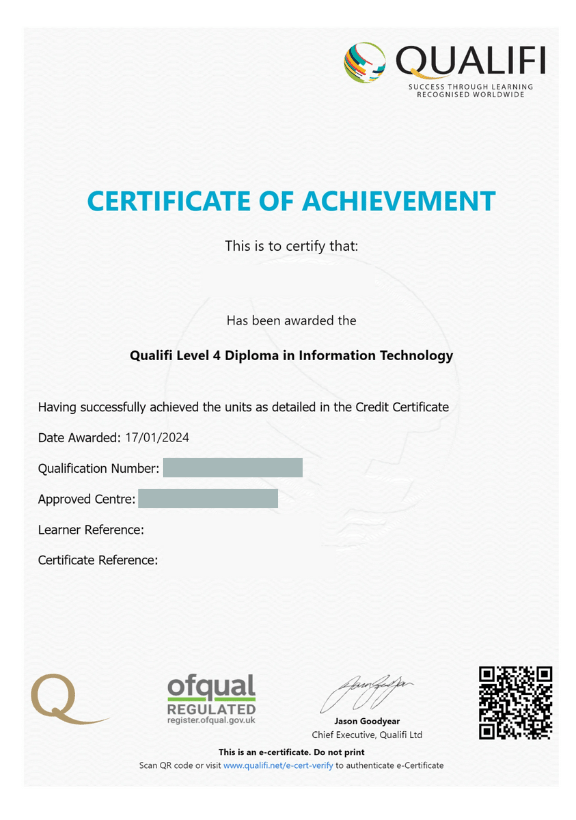
Sample Transcript:
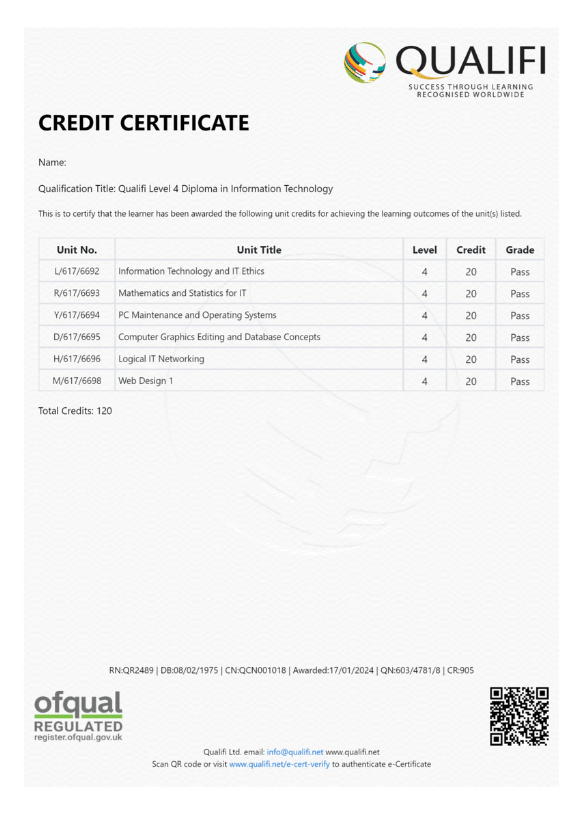
2. Earn 10 Level 4 Pro Recognized e-Certificates
Upon completing the first year, students will receive 10 Level 4 Pro Recognized e-Certificates:
- Level 4 e-Certificate in Computer Systems and Software: Understand the integration of hardware and software components for effective system operation.
- Level 4 e-Certificate in Computer Programming: Develop skills to design, implement, and test programs using system life cycle techniques.
- Level 4 e-Certificate in Relational Database Systems: Gain expertise in database systems, data analysis, and modeling for efficient data management.
- Level 4 e-Certificate in Software Engineering: Learn the principles, methods, and techniques essential for effective software development.
- Level 4 e-Certificate in Systems Analysis and Design: Understand IS concepts and their application to business processes and information transformation.
- Level 4 e-Certificate in E-commerce Applications: Explore e-commerce design and business strategies to meet organizational goals.
- Level 4 e-Certificate in Human-Computer Interaction: Develop skills to evaluate and plan multimedia user interfaces using HCI principles.
- Level 4 e-Certificate in IT and Society: Examine the societal impact of technology and address issues like security and data management.
- Level 4 e-Certificate in Information Systems Theory and Practice: Learn project management techniques for successful IT project implementation.
- Level 4 e-Certificate in Management Information Systems: Understand how information systems support business needs through data processing and analysis.
Students can convert their e-certificates into hard copy certificates if needed (optional).
3. Gain competencies
Upon completing the first year, students will have acquired the following competencies and, along with the qualification received, will be ready to enter the workforce:
- Utilize IT tools and techniques to create professional documents, presentations, and databases.
- Apply ethical principles to address challenges related to privacy, cybersecurity, and intellectual property.
- Develop mathematical and statistical skills to analyze data and solve IT-related problems.
- Assemble, configure, and maintain IT systems, ensuring operational efficiency and reliability.
- Create and edit digital graphics and images for effective integration into IT solutions.
- Design, implement, and manage logical networks to support organizational needs.
- Develop functional and visually appealing websites using modern web design techniques.
- Work collaboratively and independently to address challenges and implement IT solutions effectively.
4. Qualified for various positions
Upon completing a Level 4 RQF diploma with these competencies, learners would be qualified for various entry-level and junior management roles across multiple industries. Here are some potential positions:
- IT Support Technician: Assist with troubleshooting and maintaining computer hardware, software, and operating systems.
- Junior Network Technician: Support logical and physical networking setups, including IP configuration and subnetting.
- Data Entry Specialist: Manage and update databases using SQL and ensure data accuracy.
- Web Content Assistant: Assist in creating and maintaining websites using HTML and CSS.
- Graphic Editing Assistant: Support photo and graphic editing tasks for professional documents and presentations.
- PC Maintenance Technician: Assemble, configure, and troubleshoot PC hardware and operating systems like Windows and Linux.
- Database Assistant: Help manage relational databases and ensure proper organization and normalization.
- IT Administrative Support: Provide administrative support for IT operations, including document creation and presentations.
These roles offer opportunities to further develop the skills acquired in the diploma and prepare for more senior positions over time.
Year 2 Learn
1. Technopreneurship (F/617/6740)
Overview:
- Develop an understanding of entrepreneurship within the technology sector, with a focus on identifying and evaluating business opportunities.
- Learn how to plan, manage, and grow technology-driven ventures.
Unit Aims:
- Equip learners with entrepreneurial skills to start and manage tech-based businesses.
- Enable learners to evaluate the commercial viability of technology products or services.
Course Details
This course is accredited and mapped to National Occupational Standards. It can also be accumulated towards earning a Level 5 Award from SIMI Swiss if taken independently.
- View details on Learning Outcomes, Topics, and Suggested Readings HERE.
2. Network Security (J/617/6741)
Overview:
- Gain a deep understanding of network security principles and practices.
- Learn how to identify, mitigate security threats, and manage secure network infrastructures.
Unit Aims:
- Analyze network security risks and implement appropriate security measures.
- Develop skills to safeguard network data and infrastructure from cyber threats.
Course Details
This course is accredited and mapped to National Occupational Standards. It can also be accumulated towards earning a Level 5 Award from SIMI Swiss if taken independently.
- View details on Learning Outcomes, Topics, and Suggested Readings HERE.
3. C#.NET Programming (L/617/6742)
Overview:
- Learn C#.NET programming to develop functional and efficient applications.
- Focus on object-oriented programming, debugging, and application development techniques.
Unit Aims:
- Equip learners with the necessary skills to design, implement, and test software using C#.NET.
- Build proficiency in debugging and optimizing C#.NET applications.
Course Details
This course is accredited and mapped to National Occupational Standards. It can also be accumulated towards earning a Level 5 Award from SIMI Swiss if taken independently.
- View details on Learning Outcomes, Topics, and Suggested Readings HERE.
4. System Administration (R/617/6743)
Overview:
- Learn the key concepts and techniques involved in managing and maintaining computer systems and networks.
- Understand the roles and responsibilities of system administrators in various environments.
Unit Aims:
- Develop practical skills in system configuration, user management, and troubleshooting.
- Learn how to ensure the operational efficiency and security of systems.
Course Details
This course is accredited and mapped to National Occupational Standards. It can also be accumulated towards earning a Level 5 Award from SIMI Swiss if taken independently.
- View details on Learning Outcomes, Topics, and Suggested Readings HERE.
5. Content Management Systems (H/617/6746)
Overview:
- Explore the principles and tools used to manage and organize digital content within websites and web applications.
- Learn how to design, implement, and maintain content management systems (CMS).
Unit Aims:
- Gain proficiency in using CMS platforms for managing web content.
- Learn how to integrate CMS with other web technologies for optimal functionality.
Course Details
This course is accredited and mapped to National Occupational Standards. It can also be accumulated towards earning a Level 5 Award from SIMI Swiss if taken independently.
- View details on Learning Outcomes, Topics, and Suggested Readings HERE.
6. Web Design 2 (M/617/6748)
Overview:
- Learn advanced web design techniques and tools to create responsive, user-friendly websites.
- Focus on modern web development languages and best practices for creating appealing web interfaces.
Unit Aims:
- Develop skills to design functional, responsive websites that provide a seamless user experience.
- Learn how to integrate HTML, CSS, JavaScript, and other web technologies to enhance web functionality and design.
Course Details
This course is accredited and mapped to National Occupational Standards. It can also be accumulated towards earning a Level 5 Award from SIMI Swiss if taken independently.
- View details on Learning Outcomes, Topics, and Suggested Readings HERE.
Year 2 Earn
1. Get Qualifi Level 5 diploma in IT Web Design
Upon completing Year 2, students will receive:
- Qualifi Level 5 Diploma in IT Web Design - Qualification Number: 603/4793/4
Qualifi Level 5 Diploma: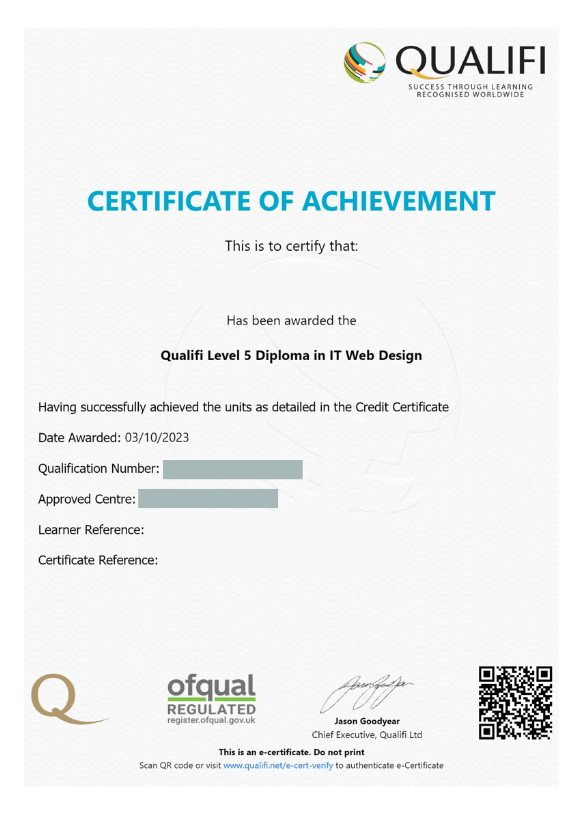
Sample Level 5 Transcript:
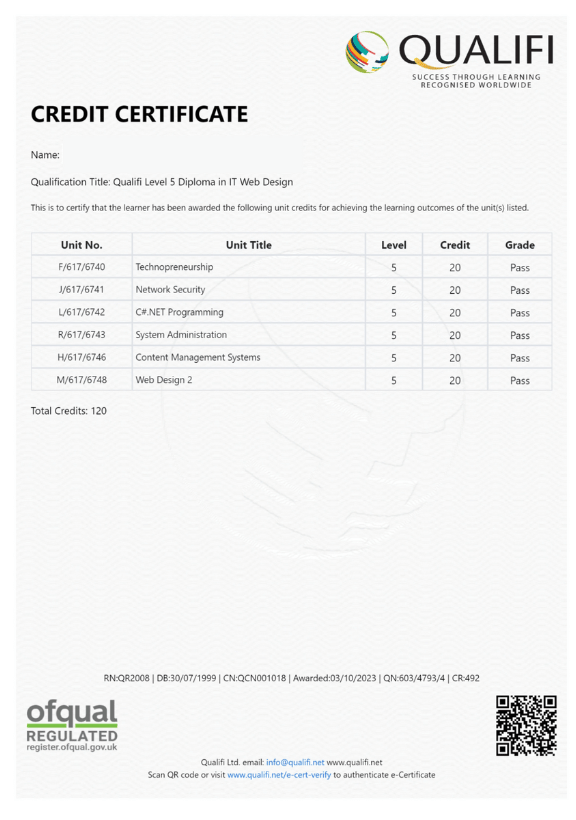
2. Earn 6 Level 5 Pro Recognized e-Certificates
Upon completing the second year, students will receive 6 Level 5 Pro Recognized e-Certificates:
- Level 5 e-Certificate in Technopreneurship:
Gain the knowledge and skills to establish and manage a technology-based business, focusing on entrepreneurship, planning, and marketing. - Level 5 e-Certificate in Network Security:
Learn to identify, prevent, and detect network security issues to protect data and ensure system integrity. - Level 5 e-Certificate in C#.NET Programming:
Understand the principles of ASP.NET programming using C# to create dynamic web pages with server-side functionality. - Level 5 e-Certificate in System Administration:
Gain practical knowledge of system administration, including managing and troubleshooting IT systems and networks. - Level 5 e-Certificate in Content Management Systems:
Learn to use Content Management Systems (CMS) to create, manage, and publish digital content effectively. - Level 5 e-Certificate in Web Design:
Develop the skills to create responsive, user-friendly websites while applying critical thinking and design principles.
Students can convert their e-certificates into hard copy certificates if needed (optional).
3. Gain competencies
Upon completing the first year, students will have acquired the following competencies and, along with the qualification received, will be ready to enter the workforce:
- Design and implement responsive, user-friendly websites to meet organizational needs.
- Apply web development technologies and tools to create dynamic and functional web applications.
- Develop skills in optimizing web interfaces for accessibility and user experience.
- Implement best practices in web security to protect websites and user data.
- Utilize content management systems (CMS) for efficient website creation and management.
- Create visually appealing graphics and digital content for web integration.
- Apply SEO techniques to optimize websites for search engines and improve traffic.
- Work independently and collaboratively to solve complex web design and development challenges.
4. Qualified for various positions
A Level 5 Diploma in Business Administration typically prepares individuals for mid-level management and professional roles within various industries. Here are some qualified positions for someone with a Level 5 Diploma in Business:
- Junior Web Developer: Assist in designing and building basic websites, ensuring functionality and user-friendly experiences.
- Junior UX/UI Designer: Create simple, visually appealing web interfaces with a focus on improving user interaction.
- Front-End Developer (Entry Level): Develop static web pages using HTML, CSS, and basic JavaScript to enhance user experience.
- Junior Back-End Developer: Support server-side operations, databases, and logic for simple web applications.
- Junior Full Stack Developer: Assist in both front-end and back-end development tasks to create cohesive web applications.
- Web Designer (Entry Level): Design basic website layouts and graphics, ensuring they align with design best practices.
- Junior E-commerce Web Developer: Assist in the development and maintenance of e-commerce platforms, focusing on product displays and basic functionality.
- Digital Marketing Assistant: Support the creation and execution of basic digital marketing strategies to drive website traffic and sales.
These roles involve a higher level of responsibility and decision-making, often requiring a combination of practical experience and theoretical knowledge gained through the Level 5 qualification.
Year 3 Learn
1. Leadership and People Management (H/616/2734)
Overview
- Divided into three parts: leadership theories, people management techniques, and their application.
- Focuses on leadership styles, team dynamics, motivation, conflict resolution, and employee engagement.
- Applies these concepts to real-world management challenges..
Unit Aims
- Develop leadership capabilities.
- Enhance understanding of people management practices to improve team performance and organizational effectiveness.
Course Details
This course is accredited and mapped to National Occupational Standards. It can also be accumulated towards earning a Bachelor Award from SIMI Swiss if taken independently.
- View details on Learning Outcomes, Topics, and Suggested Readings HERE.
2. Business Research (K/616/2735 )
Overview
- Divided into three parts: understanding research methodology, applying research tools, and conducting a business research project.
- Covers qualitative and quantitative research methods, data collection tools, and business research project execution.
Unit Aims
- Develop research skills.
- Conduct rigorous business research that contributes to strategic decision-making and organizational development.
Course Details
This course is accredited and mapped to National Occupational Standards. It can also be accumulated towards earning a Bachelor Award from SIMI Swiss if taken independently.
- View details on Learning Outcomes, Topics, and Suggested Readings HERE.
3. Operations Management (M/616/2736)
Overview
- Divided into three parts: key operations management concepts, resource management, and applying operations tools.
- Focuses on supply chain management, process optimization, quality control, and performance measurement.
Unit Aims
- Enhance understanding of operations management principles.
- Develop skills for optimizing processes, improving efficiency, and ensuring operational excellence.
Course Details
This course is accredited and mapped to National Occupational Standards. It can also be accumulated towards earning a Bachelor Award from SIMI Swiss if taken independently.
- View details on Learning Outcomes, Topics, and Suggested Readings HERE.
4. Financial Decision Making (T/616/2737)
Overview
- Divided into three parts: core financial concepts, financial analysis tools, and real-world business applications.
- Covers financial statements, budgeting, cost analysis, and investment appraisal.
Unit Aims
- Equip learners with skills for making strategic financial decisions.
- Optimize financial performance to support business growth and sustainability.
Course Details
This course is accredited and mapped to National Occupational Standards. It can also be accumulated towards earning a Bachelor Award from SIMI Swiss if taken independently.
- View details on Learning Outcomes, Topics, and Suggested Readings HERE.
5. Sustainable Business Practices (A/616/2738)
Overview
- Divided into three parts: core financial concepts, financial analysis tools, and real-world business applications.
- Covers financial statements, budgeting, cost analysis, and investment appraisal.
Unit Aims
- Enhance understanding of sustainability in business.
- Equip learners to design and implement sustainable practices that align with organizational goals.
Course Details
This course is accredited and mapped to National Occupational Standards. It can also be accumulated towards earning a Bachelor Award from SIMI Swiss if taken independently.
- View details on Learning Outcomes, Topics, and Suggested Readings HERE.
6. Strategic Human Resource Management (F/616/2739)
Overview
- Divided into three parts: strategic HRM, HR practices, and real-world applications.
- Covers talent management, workforce planning, recruitment, training, and performance management.
Unit Aims
- Develop an understanding of the strategic role of HRM in business success.
- Equip learners with the skills to align HR strategies with organizational goals and foster a positive work culture.
Course Details
This course is accredited and mapped to National Occupational Standards. It can also be accumulated towards earning a Bachelor Award from SIMI Swiss if taken independently.
- View details on Learning Outcomes, Topics, and Suggested Readings HERE.
Year 3 Earn
1. Get OTHM Level 6 diploma in Business Management
Upon completing Year 3, students will receive:
- OTHM Level 6 Diploma in Business Management - Qualification Number: 603/2179/9
Sample Level 6 Diploma:
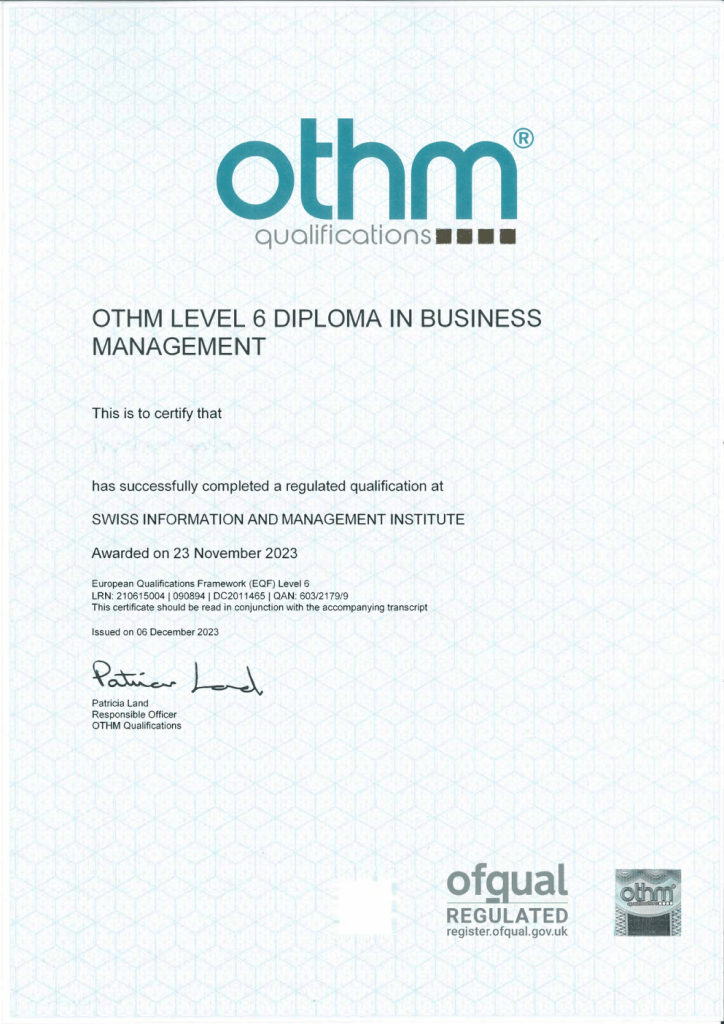
Page 1 of sample diploma
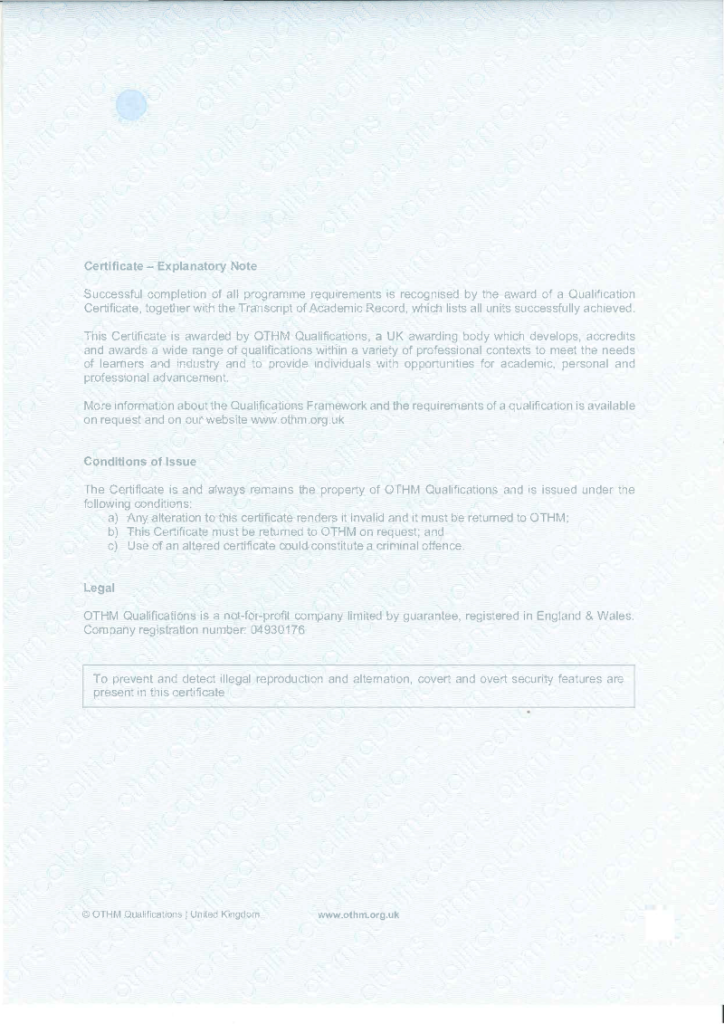
Page 2 of sample diploma
Sample Level 6 Transcript:
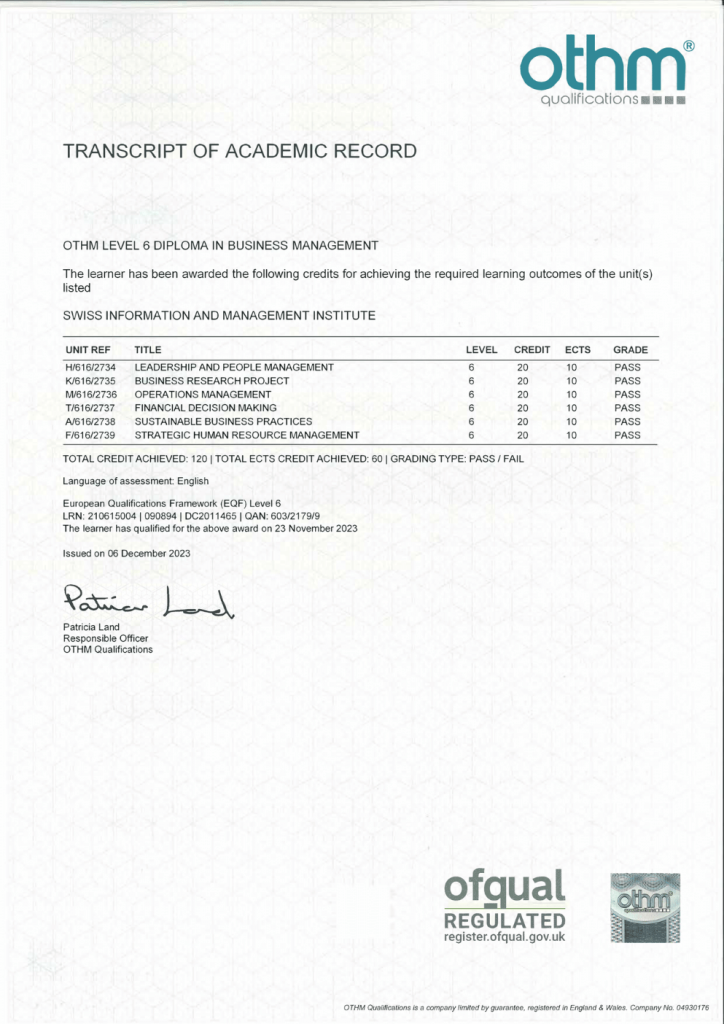
Page 1 of sample transcript
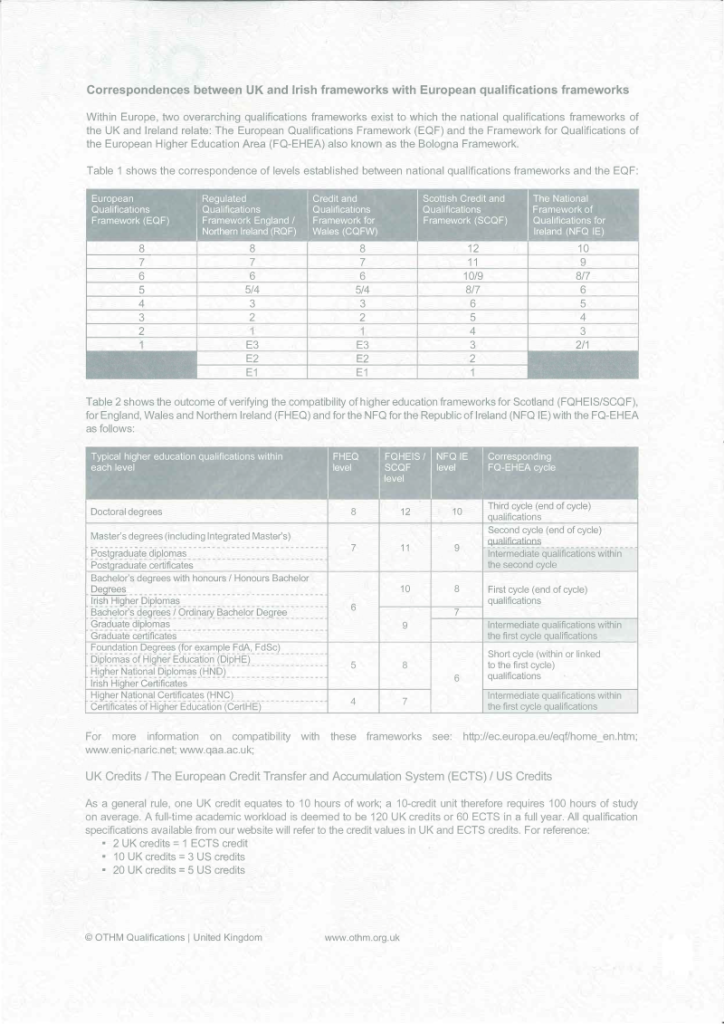
Page 2 of sample transcript
2. Earn 10 Level 6 Pro Recognized e-Certificates
Upon completing the first year, students will receive 10 Level 6 Pro Recognized e-Certificates:
- Level 6 in IT in Business: Evaluate the strategic role of IT in achieving competitive advantage.
- Level 6 in Effective Communication: Master communication strategies to enhance decision-making and collaboration.
- Level 6 in High-Performance Teams: Develop advanced team-building skills for cohesive and productive teams.
- Level 6 in Leadership Skills: Build adaptive leadership capabilities to navigate organizational challenges.
- Level 6 in Manager’s Toolkit: Learn versatile tools for analysis, problem-solving, and strategic planning.
- Level 6 in Managing and Using Finance: Understand finance’s role in guiding strategic decisions.
- Level 6 in Managing and Using Marketing: Create customer-centric strategies to deliver value and satisfaction.
- Level 6 in Managing Organizations: Explore how structure, culture, and management influence performance.
- Level 6 in Personal Effectiveness: Enhance productivity and self-leadership for impactful results.
- Level 6 in Quality and Excellence: Explore the meaning of quality and excellence in products, services, and organizational practices.
Students can convert their e-certificates into hard copy certificates if needed (optional).
3. Gain competencies
Upon completing the first year, students will have acquired the following competencies and, along with the qualification received, will be ready to enter the workforce:
- Strategic Management: Develop and implement strategies to achieve organizational objectives.
- Leadership Skills: Lead teams effectively in dynamic and competitive environments.
- Financial Decision-Making: Analyze financial data to inform strategic business decisions.
- Effective Communication: Master advanced communication techniques for stakeholder engagement.
- Marketing Strategies: Design and execute impactful marketing plans to drive business growth.
- Operational Management: Optimize processes and resources for efficient business operations.
- Problem-Solving and Decision-Making: Apply critical thinking to solve complex business challenges.
- Legal and Ethical Understanding: Navigate legal frameworks and ethical considerations in business.
- Research and Analysis: Conduct in-depth research to support evidence-based decisions.
- Organizational Development: Foster innovation, culture, and performance improvements.
4. Qualified for various positions
Upon completing a Level 6 RQF diploma with these competencies, learners would be qualified for various entry-level and junior management roles across multiple industries. Here are some potential positions:
- Business Manager: Oversee operations, strategy, and organizational goals.
- Operations Manager: Streamline processes and manage day-to-day business activities.
- Marketing Manager: Design and implement marketing strategies to enhance brand performance.
- Finance Manager: Analyze and oversee financial planning, budgeting, and decision-making.
- HR Manager: Develop and manage talent acquisition, employee relations, and HR strategies.
- Project Manager: Lead projects, ensuring they meet objectives, budgets, and deadlines.
- Strategic Planner: Develop long-term plans to achieve organizational goals.
- Team Leader: Motivate and manage teams to meet performance targets.
- Consultant: Provide expert advice in areas such as operations, marketing, or finance.
These roles offer opportunities to further develop the skills acquired in the diploma and prepare for more senior positions over time.
Bachelor Final Stage Learn
Capstone Project
Overview
A Capstone Project is a comprehensive, final assignment that BBA students complete at the end of their program. It is designed to encapsulate the knowledge and skills they have acquired throughout their studies. Unlike traditional exams, a Capstone Project requires students to apply what they've learned to a real-world problem or challenge in their field.
Unit Aims
The capstone aims to provide students:
- Practical Application: The project typically involves solving a practical business problem, conducting research, or developing a strategic plan for a real or simulated organization.
- Integration of Knowledge: Students must integrate and apply concepts from multiple courses, demonstrating their ability to synthesize information and use it effectively in a professional context.
- Research Component: Often, a Capstone Project includes a significant research element, requiring students to gather, analyze, and interpret data to support their conclusions and recommendations.
- Collaboration: Some Capstone Projects are completed in teams, simulating the collaborative nature of real business environments. Others may be individual projects, allowing for a deep dive into a specific area of interest.
- Presentation and Defense: Upon completion, students typically present their project to a panel of faculty members or industry professionals, and defend their methodology, findings, and recommendations.
Benefits of a Capston Project:
- Real-World Experience: Students gain hands-on experience by working on actual business problems or scenarios.
- Skill Development: The project hones critical thinking, problem-solving, research, and communication skills.
- Portfolio Piece: The completed project can serve as a showcase of the student's capabilities, useful for job interviews or career advancement.
- Networking: Projects often involve collaboration with industry professionals, providing valuable networking opportunities.
In essence, a Capstone Project is the culmination of an BBA program, allowing students to demonstrate their expertise and readiness for professional challenges.
Bachelor Final Stage Earn
1. Get Bachelor of Business Administration (with Hons) in IT and Web Design
The Capstone Project, as the culmination of their learning, will showcase learners' ability to apply theoretical knowledge to practical, real-world challenges. This not only enhances their academic credentials but also provides employers with a clear indication of their expertise in financial management.
The selected major will be integrated into their academic progression and will be clearly reflected in their Bachelor of Business Administration (with Hons) in IT and Web Design qualification, as well as the official transcripts issued by SIMI Swiss.
Sample of Bachelor of Business Administration (with Hons) in IT and Web Design:
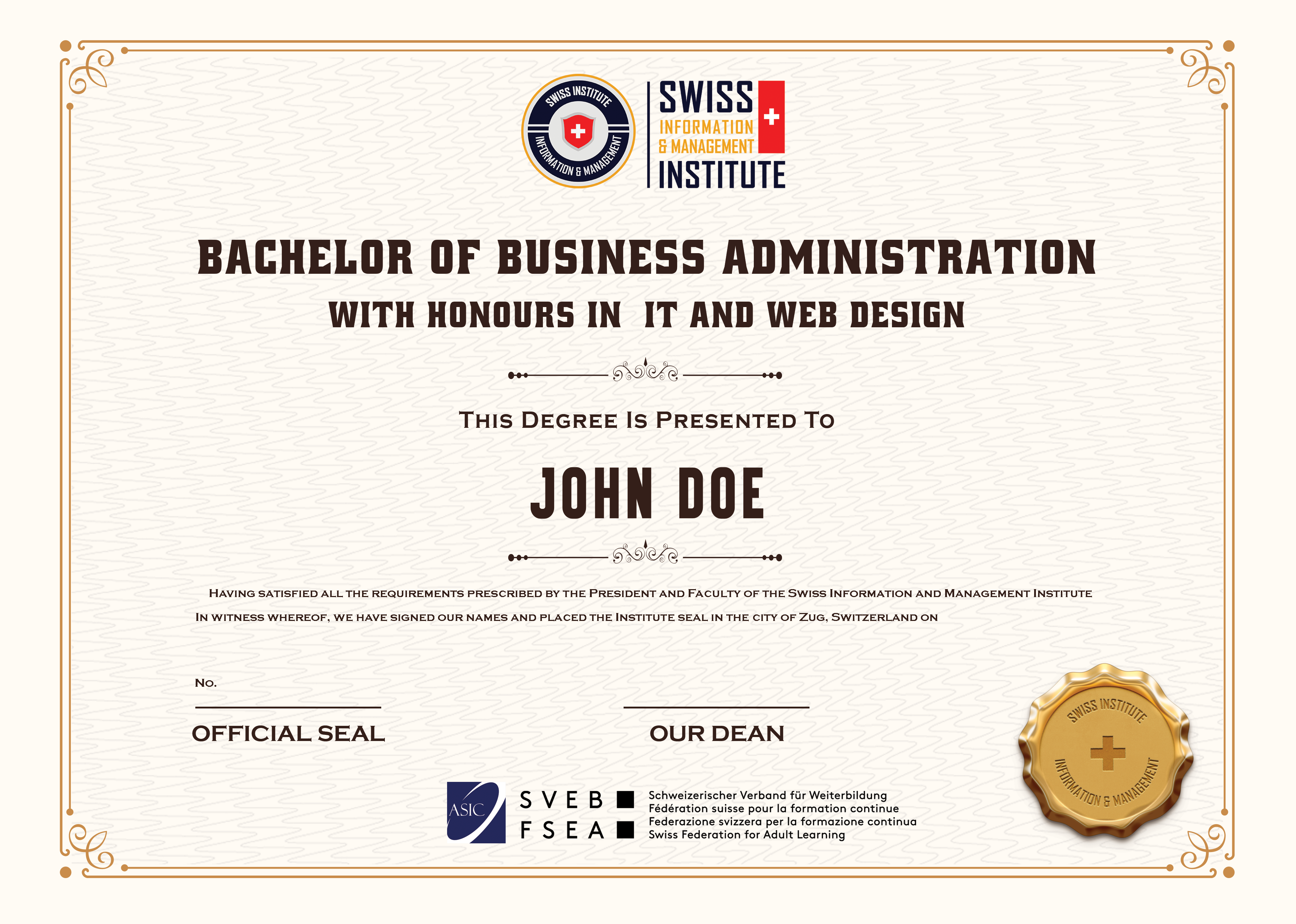
2. Gain competencies
Upon completing the first year, students will have acquired the following competencies and, along with the qualification received, will be ready to enter the workforce:
- Design and develop responsive, user-friendly websites to meet organizational and user needs.
- Implement security measures to protect web applications and user data from cyber threats.
- Apply innovative web development technologies and tools to enhance user experience and functionality.
- Conduct research to solve complex web design and IT-related challenges using both qualitative and quantitative methods.
- Utilize advanced programming techniques to create dynamic and efficient web applications.
- Manage and execute IT projects, ensuring timely delivery and alignment with business objectives.
- Apply ethical principles and ensure legal compliance in web design and IT practices.
- Communicate effectively in professional settings, both verbally and in writing, to collaborate on IT and web design projects.
3. Qualified for various positions
A BBA (with Hons) in IT and Web Design typically prepares individuals for mid-level management and professional roles within various industries. Here are some qualified positions for someone with a BBA:
- Senior Web Developer: Lead the development and design of complex, high-performance websites, ensuring seamless functionality and superior user experience.
- Lead UI/UX Designer: Drive the design of innovative user interfaces, enhancing user interaction through research and prototyping.
- Full Stack Developer: Manage both front-end and back-end development of web applications, ensuring integration across systems and platforms.
- Web Development Team Lead: Supervise and mentor a team of web developers, guiding the development process and ensuring the completion of high-quality projects.
- E-commerce Solutions Architect: Design and implement e-commerce platforms, integrating business operations with web technologies for enhanced online sales.
- Digital Strategy Manager: Develop and execute strategies for online presence, using SEO, web analytics, and other digital tools to maximize performance.
- Web Development Director: Oversee the strategic direction and execution of web development projects, ensuring they align with business goals and technology trends.
- IT Consultant (Web Design & Development): Provide expert advice to businesses on the design, development, and optimization of their web platforms to improve operational efficiency.
These roles involve a higher level of responsibility and decision-making, often requiring a combination of practical experience and theoretical knowledge gained through the Level 5 qualification.
Entry requirements & Learning methods
1. Entry Requirements
In addition to the entry requirements, candidates applying to the program are also assessed for their suitability by the admissions committee before joining the program to ensure that they can acquire and benefit from the program.
Entry requirements:
To enroll this program, learners must possess the criteria below:
- Attained a Level 3 Diploma under the NQF/QCF/RQF system or its equivalent.
English requirements:
If a learner is not from a predominantly English-speaking country, proof of English language proficiency must be provided.
- Common European Framework of Reference (CEFR) level B2 or equivalent;
- Or A minimum TOEFL score of 101 or IELTS 5.5; Reading and Writing must be at 5.5 or equivalent.
Please note:
- SIMI Swiss does not accept entry qualifications from counterfeit universities, Diploma Mills, or universities accredited by unreliable accreditation agencies.
- SIMI Swiss reserves the right to make admissions decisions based on the requirements of recognized agencies and the global quotas of the program.
2. Learning methods
1. Off-Campus Mode
The program is a combination between Live Classes with local tutors (where applicable) for a hybrid learning experience.
- Offering interactive, real-time engagement with instructors.
- Local tutors provide additional guidance to help learners apply theoretical concepts to practical scenarios.
- Ideal for busy professionals seeking flexibility with personalized support.
Learn more about overview of enrolling in online classes at SIMI Swiss [Video HERE]
Learn more about the Effective of SIMI Pedagogy [Video HERE]
2. Fully Online Model
The program is implemented using a combined automated training model that includes:
- Optimized Online Learning System: Designed to enhance the self-study process.
- Bite-Sized Lectures: Lessons are structured in short, manageable modules, enabling students to grasp the content immediately after completing each module.
- Comprehensive Support System: Provides students with the necessary tools and support to efficiently fulfill course requirements.
Learn more about how to use the automated training model at SIMI Swiss [Video HERE]
3. Academic Support
We understand that pursuing an accredited postgraduate program can be both exciting and challenging, especially for busy adult learners. To help you overcome these challenges, we’ve created the SIMI Swiss Supporting Systems, designed to guide you through any difficulties during your studies.
For a full overview of the support available, be sure to watch our informative videos, offering help at every stage of your academic journey.
Supplemental resources and Undergraduate Pro Certified
1. Supply 26 courses mapped to National Occupational Standards
The National Occupational Standard is a crucial benchmark that ensures educational programs meet workplace demands. The BBA (with Hons) in IT and Web Design program is fully aligned with the Senior Leader position according to the national competency framework.
Beyond the comprehensive BBA (with Hons) in IT and Web Design curriculum, students gain access to an additional 26 professional modules covering a wide range of specializations. This expanded knowledge base enables students to build on their classroom learning and directly apply it to their specific job roles and needs, offering valuable tools for professional growth.
Unlike other study materials, this interactive and exclusive set of resources, developed by SIMI Swiss, is specifically designed for self-study. The knowledge system, aligned with the National Occupational Standard, is divided into 26 knowledge groups, each further broken down into bite-sized lessons. This approach allows students to absorb content quickly and effectively, even when away from their computer or phone.
- Learn more about the National Occupational Standard system [HERE].
- Learn more about the exclusive pedagogy for the supplemental interactive study materials [HERE].
- Learn more about the Master Professional Certified [HERE]
The 26 interactive courses that enhance knowledge and automatically accumulate 26 separate Undergraduate Pro Certifications include:
- Level 4 Pro-Certificate in Computer Systems and Software
- Level 4 Pro-Certificate in Computer Programming
- Level 4 Pro-Certificate in Relational Database Systems
- Level 4 Pro-Certificate in Software Engineering
- Level 4 Pro-Certificate in Systems Analysis and Design
- Level 4 Pro-Certificate in E-commerce Applications
- Level 4 Pro-Certificate in Human-Computer Interaction
- Level 4 Pro-Certificate in IT and Society
- Level 4 Pro-Certificate in Information Systems Theory and Practice
- Level 4 Pro-Certificate in Management Information Systems
- Level 5 Pro-Certificate in Technopreneurship
- Level 5 Pro-Certificate in Network Security
- Level 5 Pro-Certificate in C.Net Programming
- Level 5 Pro-Certificate in System administration
- Level 5 Pro-Certificate in Content management systems
- Level 5 Pro-Certificate in Web design
- Level 6 Pro-Certificate in IT in Business
- Level 6 Pro-Certificate in Effective Communications
- Level 6 Pro-Certificate in High Performance Teams
- Level 6 Pro-Certificate in Leadership Skills
- Level 6 Pro-Certificate in Manager’s Toolkit
- Level 6 Pro-Certificate in Managing and Using Finance
- Level 6 Pro-Certificate in Managing and Using Marketing
- Level 6 Pro-Certificate in Managing Organisations
- Level 6 Pro-Certificate in Personal Effectiveness
- Level 6 Pro-Certificate in Quality and Excellence
2. Supply 26 webinars mapped to National Occupational Standards
In addition to comprehensive lessons with built-in interactive activities and an exclusive self-study pedagogy, each knowledge module aligned with the National Occupational Standard includes instructional videos (webinars). BBA (Hons) in Majors students at SIMI Swiss are provided with 26 video webinars corresponding to the 26 interactive modules, ensuring a well-rounded and complete learning experience.
The 26 video webinars include:
- Webinar - Computer Systems and Software: Explores the integration of hardware and software components for effective system operations.
- Webinar - Computer Programming: Covers tools and techniques for designing, implementing, and testing programs using the system life cycle.
- Webinar - Relational Database Systems: Focuses on database design, data modeling, and implementing relational database solutions.
- Webinar - Software Engineering: Examines the need for software engineering and techniques for developing reliable software.
- Webinar - Systems Analysis and Design: Explores IS concepts and their application to business processes and information transformation.
- Webinar - E-commerce Applications: Covers strategies for designing e-commerce systems to meet business goals and user requirements.
- Webinar - Human-Computer Interaction: Discusses principles and models for designing user-friendly multimedia interfaces.
- Webinar - IT and Society: Analyzes the societal impact of IT, including trends, security, and data management issues.
- Webinar - Information Systems Theory and Practice: Explores project management techniques for developing and implementing IT solutions.
- Webinar - Management Information Systems: Examines how MIS supports business processes and decision-making through effective data processing.
- Webinar - Technopreneurship: Focuses on developing the skills and knowledge required to establish and manage a technology-based business.
- Webinar - Network Security: Explores essential network security principles and best practices for safeguarding IT systems and preventing security breaches.
- Webinar - C#.NET Programming: Introduces the basics of C#.NET programming to create dynamic, server-side web applications using ASP.NET.
- Webinar - System Administration: Covers the key responsibilities and techniques in system administration, including system configuration, troubleshooting, and maintenance.
- Webinar - Content Management Systems: Focuses on using CMS tools to create, manage, and optimize digital content for websites and web applications.
- Webinar - Web Design: Explores the principles and practices for designing responsive, user-friendly websites that provide seamless user experiences.
- Webinar - IT in Business: Explores the role of information technology in enhancing business efficiency and decision-making.
- Webinar - Effective Communications: Focuses on improving communication in business, emphasizing clarity and influence.
- Webinar - High Performance Teams: Discusses strategies for building and leading high-performing teams in organizations.
- Webinar - Leadership Skills: Focuses on developing essential leadership skills for managing teams and organizations.
- Webinar - Manager’s Toolkit: Introduces key management tools and techniques for effective decision-making and problem-solving.
- Webinar - Managing and Using Finance: Teaches how to effectively manage financial resources for business success.
- Webinar - Managing and Using Marketing: Focuses on applying marketing strategies to enhance business growth and customer engagement.
- Webinar - Managing Organisations: Examines strategies for managing organizational structure, culture, and operations.
- Webinar - Personal Effectiveness: Focuses on improving personal productivity and effectiveness in a professional setting.
- Webinar - Quality and Excellence: Explores the principles of quality management and achieving excellence in business processes.
3. Earn 26 Undergraduate Pro Certifications via automated testing
While an BBA (with Hons) in IT and Web Design degree certifies academic achievement at the Bachelor's level, in the workplace, Undergraduate Pro Certifications help professionals demonstrate their knowledge, skills, and ability to take responsibility in their specific fields.
As a program mapped to National Occupational Standards, along with the supplemental knowledge system, students can engage in self-study through interactive lessons, attend webinars, and take online tests to earn 26 Undergraduate Pro Certifications. Each ProCert reflects Level 4,5,6 (Undergraduate Level), outlines the Learning Outcomes, and provides certification upon completion.
If students wish to convert their e-Undergraduate Pro Certifications to hard copies, they can use an optional service for a minimal fee.
The 26 Undergraduate ProCerts that learners can obtain during the BBA (with Hons) in IT and Web Design program (note: this is optional):
- Level 4 Pro-Certificate in Computer Systems and Software
- Level 4 Pro-Certificate in Computer Programming
- Level 4 Pro-Certificate in Relational Database Systems
- Level 4 Pro-Certificate in Software Engineering
- Level 4 Pro-Certificate in Systems Analysis and Design
- Level 4 Pro-Certificate in E-commerce Applications
- Level 4 Pro-Certificate in Human-Computer Interaction
- Level 4 Pro-Certificate in IT and Society
- Level 4 Pro-Certificate in Information Systems Theory and Practice
- Level 4 Pro-Certificate in Management Information Systems
- Level 5 Pro-Certificate in Technopreneurship
- Level 5 Pro-Certificate in Network Security
- Level 5 Pro-Certificate in C.Net Programming
- Level 5 Pro-Certificate in System administration
- Level 5 Pro-Certificate in Content management systems
- Level 5 Pro-Certificate in Web design
- Level 6 Pro-Certificate in IT in Business
- Level 6 Pro-Certificate in Effective Communications
- Level 6 Pro-Certificate in High Performance Teams
- Level 6 Pro-Certificate in Leadership Skills
- Level 6 Pro-Certificate in Manager’s Toolkit
- Level 6 Pro-Certificate in Managing and Using Finance
- Level 6 Pro-Certificate in Managing and Using Marketing
- Level 6 Pro-Certificate in Managing Organisations
- Level 6 Pro-Certificate in Personal Effectiveness
- Level 6 Pro-Certificate in Quality and Excellence
Check out the way you could get 26 electric Undergraduate Professional Certified [Video HERE]
Program accreditations
1. Accreditation review guidelines by SIMI Swiss
SIMI is the first higher education institute in Zug, Switzerland, to achieve comprehensive international accreditations at both the organizational and program levels. The video below guides you through the step-by-step process of verifying and checking SIMI Swiss's accreditations and recognitions. All MBA Swiss programs, owned by SIMI Swiss, benefit from these quality standards.
2. Refer to SIMI Swiss information in SVEB Switzerland
SVEB Switzerland (Schweizerischer Verband für Weiterbildung) is the Swiss Federation for Adult Learning and serves as the national umbrella organization for adult education in Switzerland. SVEB is recognized as the leading authority in Switzerland for promoting and supporting lifelong learning and professional development through a wide range of educational programs and certifications.
Benefits of the SIMI Programs Published in SVEB:
- Officially on the Swiss federal portal: Being published in SVEB gives the SIMI Swiss program official publication in Switzerland, validating its quality and adherence to Swiss educational standards.
- Increased Credibility: Membership and listing with SVEB enhance the credibility of the SIMI Swiss program, making it more attractive to prospective students and employers who value SVEB-approved programs.
- Professional Advancement: Programs listed with SVEB are often aligned with the needs of the Swiss job market, increasing graduates' employability and supporting their career progression within Switzerland.
- Access to a Wider Network: Association with SVEB connects the SIMI Swiss program to a broader network of educational institutions, professionals, and employers across Switzerland, offering opportunities for collaboration, networking, and knowledge exchange.
- Compliance with Swiss Standards: SVEB ensures that SIMI Swiss programs meet high educational standards, including up-to-date content, qualified instructors, and effective teaching methods, enhancing the overall learning experience for students.
- Support for Lifelong Learning: SVEB’s focus on adult education means the SIMI program aligns with lifelong learning principles, supporting students in their ongoing professional development.
Check the SIMI Swiss programs on SVEB HERE.
3. Accreditation of Level 6 Diploma in Business Management of OTHM
The BBA program at SIMI Swiss offers a dual degree in partnership with OTHM, the Ofqual UK.Gov awarding body:
- Recognized as an organization by the educational authority of the United Kingdom, Ofqual (UK.Gov). Recognition Number: RN5284. Refer to the recognition information CLICK HERE
- OTHM Level 6 Diploma in Business Management is accredited with the Ofqual UK.Gov code 603/2179/9. Refer to the accreditation information CLICK HERE
Reference:
- Guidelines of how to check the recognition of OTHM: CLICK HERE
- Why Level UK offers optimal educational effectiveness for learners?: CLICK HERE
- The meaning of Level System in the labor market in the context of global labor mobility: CLICK HERE
- The meaning of Level System in global diploma recognition: CLICK HERE
You will get
Dual Bachelor
26 Pro Recognized
Swiss Student Card
Academic Support
Update Trend
All Undergraduate Programs
Fully Accredited
Multi Recognition
Bachelor of Business Administration (For Individual with Experience)
Powered by BizSchool of Zug
Bachelor of Business Administration
Powered by BizSchool of Zug
Bachelor of Accounting and Finance
Powered by BizSchool of Zug
Bachelor of IT and Computing
Powered by IT Institute of Switzerland
Bachelor IT and E-commerce
Powered by IT Institute of Switzerland
Bachelor of IT and Networking
Powered by IT Institute of Switzerland
Bachelor of IT and Web Design
Powered by IT Institute of Switzerland
Bachelor of Hospitality & Tourism Management
Powered by Hospitality School
Bachelor of Health & Social Care Management
Powered by Swiss Healthcare School
Bachelor of Logistics and Supply Chain Management
Powered by LSCM Switzerland
Bachelor of Education and Training Management
Powered by Swiss EduSchool
